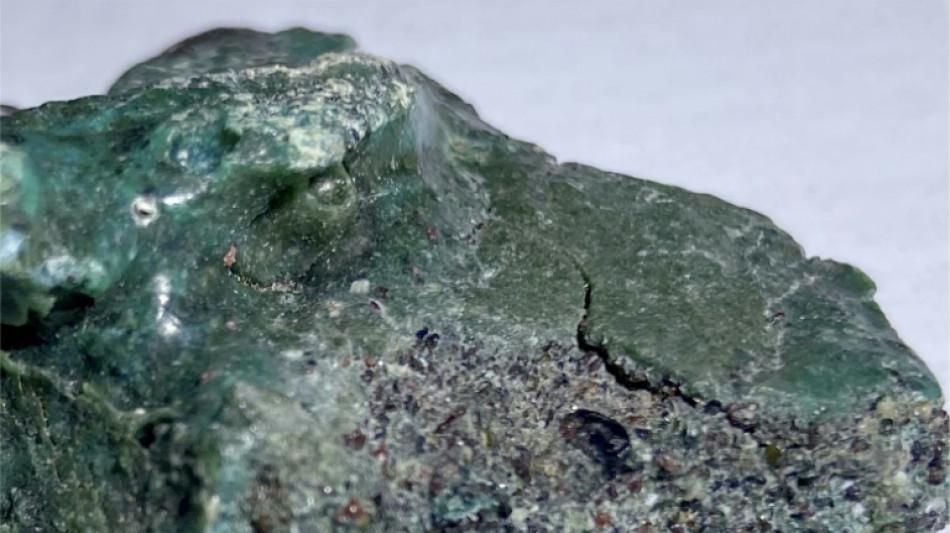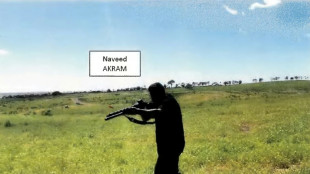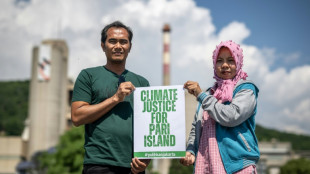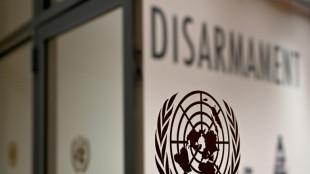
-
 Thailand says Cambodia agrees to border talks after ASEAN meet
Thailand says Cambodia agrees to border talks after ASEAN meet
-
Alleged Bondi shooters conducted 'tactical' training in countryside, Australian police say

-
 Swiss court to hear landmark climate case against cement giant
Swiss court to hear landmark climate case against cement giant
-
Knicks' Brunson scores 47, Bulls edge Hawks epic

-
 Global nuclear arms control under pressure in 2026
Global nuclear arms control under pressure in 2026
-
Asian markets rally with Wall St as rate hopes rise, AI fears ease

-
 Jailed Malaysian ex-PM Najib loses bid for house arrest
Jailed Malaysian ex-PM Najib loses bid for house arrest
-
Banned film exposes Hong Kong's censorship trend, director says

-
 Duffy, Patel force West Indies collapse as NZ close in on Test series win
Duffy, Patel force West Indies collapse as NZ close in on Test series win
-
Australian state pushes tough gun laws, 'terror symbols' ban after shooting

-
 A night out on the town during Nigeria's 'Detty December'
A night out on the town during Nigeria's 'Detty December'
-
US in 'pursuit' of third oil tanker in Caribbean: official

-
 CO2 soon to be buried under North Sea oil platform
CO2 soon to be buried under North Sea oil platform
-
Steelers edge Lions as Bears, 49ers reach playoffs

-
 India's Bollywood counts costs as star fees squeeze profits
India's Bollywood counts costs as star fees squeeze profits
-
McCullum admits errors in Ashes preparations as England look to salvage pride

-
 Pets, pedis and peppermints: When the diva is a donkey
Pets, pedis and peppermints: When the diva is a donkey
-
'A den of bandits': Rwanda closes thousands of evangelical churches

-
 Southeast Asia bloc meets to press Thailand, Cambodia on truce
Southeast Asia bloc meets to press Thailand, Cambodia on truce
-
As US battles China on AI, some companies choose Chinese

-
 AI resurrections of dead celebrities amuse and rankle
AI resurrections of dead celebrities amuse and rankle
-
Heirs Energies Agrees $750m Afreximbank Financing to Drive Long-Term Growth

-
 Black Book Poll: "Governed AI" Emerges as the Deciding Factor in 2026 NHS Procurement
Black Book Poll: "Governed AI" Emerges as the Deciding Factor in 2026 NHS Procurement
-
Hemogenyx Pharmaceuticals PLC Announces Update on Admission of Shares

-
 Pantheon Resources PLC Announces Shareholder Letter and Corporate Update on Dubhe-1
Pantheon Resources PLC Announces Shareholder Letter and Corporate Update on Dubhe-1
-
Tocvan Begins Trenching Material for the Pilot Mine and Pushes Ahead With Infrastructure Development

-
 Steelers receiver Metcalf strikes Lions fan
Steelers receiver Metcalf strikes Lions fan
-
Morocco coach 'taking no risks' with Hakimi fitness

-
 Gang members given hundreds-years-long sentences in El Salvador
Gang members given hundreds-years-long sentences in El Salvador
-
Chargers, Bills edge closer to playoff berths

-
 Gang members given hundred-years-long sentences in El Salvador
Gang members given hundred-years-long sentences in El Salvador
-
Hosts Morocco off to winning start at Africa Cup of Nations

-
 No jacket required for Emery as Villa dream of title glory
No jacket required for Emery as Villa dream of title glory
-
Amorim fears United captain Fernandes will be out 'a while'

-
 Nigerian government frees 130 kidnapped Catholic schoolchildren
Nigerian government frees 130 kidnapped Catholic schoolchildren
-
Captain Kane helps undermanned Bayern go nine clear in Bundesliga

-
 Captain Kane helps undermanned Bayern go nine clear
Captain Kane helps undermanned Bayern go nine clear
-
Rogers stars as Villa beat Man Utd to boost title bid

-
 Barca strengthen Liga lead at Villarreal, Atletico go third
Barca strengthen Liga lead at Villarreal, Atletico go third
-
Third 'Avatar' film soars to top in N. American box office debut

-
 Third day of Ukraine settlement talks to begin in Miami
Third day of Ukraine settlement talks to begin in Miami
-
Barcelona's Raphinha, Yamal strike in Villarreal win

-
 Macron, on UAE visit, announces new French aircraft carrier
Macron, on UAE visit, announces new French aircraft carrier
-
Barca's Raphinha, Yamal strike in Villarreal win

-
 Gunmen kill 9, wound 10 in South Africa bar attack
Gunmen kill 9, wound 10 in South Africa bar attack
-
Allegations of new cover-up over Epstein files

-
 Atletico go third with comfortable win at Girona
Atletico go third with comfortable win at Girona
-
Schwarz breaks World Cup duck with Alta Badia giant slalom victory

-
 Salah unaffected by Liverpool turmoil ahead of AFCON opener - Egypt coach
Salah unaffected by Liverpool turmoil ahead of AFCON opener - Egypt coach
-
Goggia eases her pain with World Cup super-G win as Vonn takes third


Scientists make 'disturbing' find on remote island: plastic rocks
There are few places on Earth as isolated as Trindade island, a volcanic outcrop a three- to four-day boat trip off the coast of Brazil.
So geologist Fernanda Avelar Santos was startled to find an unsettling sign of human impact on the otherwise untouched landscape: rocks formed from the glut of plastic pollution floating in the ocean.
Santos first found the plastic rocks in 2019, when she traveled to the island to research her doctoral thesis on a completely different topic -- landslides, erosion and other "geological risks."
She was working near a protected nature reserve known as Turtle Beach, the world's largest breeding ground for the endangered green turtle, when she came across a large outcrop of the peculiar-looking blue-green rocks.
Intrigued, she took some back to her lab after her two-month expedition.
Analyzing them, she and her team identified the specimens as a new kind of geological formation, merging the materials and processes the Earth has used to form rocks for billions of years with a new ingredient: plastic trash.
"We concluded that human beings are now acting as a geological agent, influencing processes that were previously completely natural, like rock formation," she told AFP.
"It fits in with the idea of the Anthropocene, which scientists are talking about a lot these days: the geological era of human beings influencing the planet's natural processes. This type of rock-like plastic will be preserved in the geological record and mark the Anthropocene."
- Island paradise -
The finding left her "disturbed" and "upset," said Santos, a professor at the Federal University of Parana, in southern Brazil.
She describes Trindade as "like paradise": a beautiful tropical island whose remoteness has made it a refuge for all sorts of species -- sea birds, fish found only there, nearly extinct crabs, the green turtle.
The only human presence on the South Atlantic island is a small Brazilian military base and a scientific research center.
"It's marvelous," she said.
"So it was all the more horrifying to find something like this -- and on one of the most ecologically important beaches."
She returned to the island late last year to collect more specimens and dig deeper into the phenomenon.
Continuing her research, she found similar rock-like plastic formations had previously been reported in places including Hawaii, Britain, Italy and Japan since 2014.
But Trindade island is the remotest place on the planet they have been found so far, she said.
She fears that as the rocks erode, they will leach microplastics into the environment and further contaminate the island's food chain.
- 'Paradigm shift' -
She and her team's study, published in September in the journal Marine Pollution Bulletin, classified the new kind of "rocks" found worldwide into several types: "plastiglomerates," similar to sedimentary rocks; "pyroplastics," similar to clastic rocks; and a previously unidentified type, "plastistones," similar to igneous rocks formed by lava flow.
"Marine pollution is provoking a paradigm shift for concepts of rock and sedimentary deposit formations," her team wrote.
"Human interventions are now so pervasive that one has to question what is truly natural."
The main ingredient in the rocks Santos discovered was remnants of fishing nets, they found.
But ocean currents have also swept an abundance of bottles, household waste and other plastic trash from around the world to the island, she said.
Santos said she plans to make the topic her main research focus.
Trindade "is the most pristine place I've ever seen," she said.
"Seeing how vulnerable it is to the trash contaminating our oceans shows how pervasive the problem is worldwide."
A.Mahlangu--AMWN



